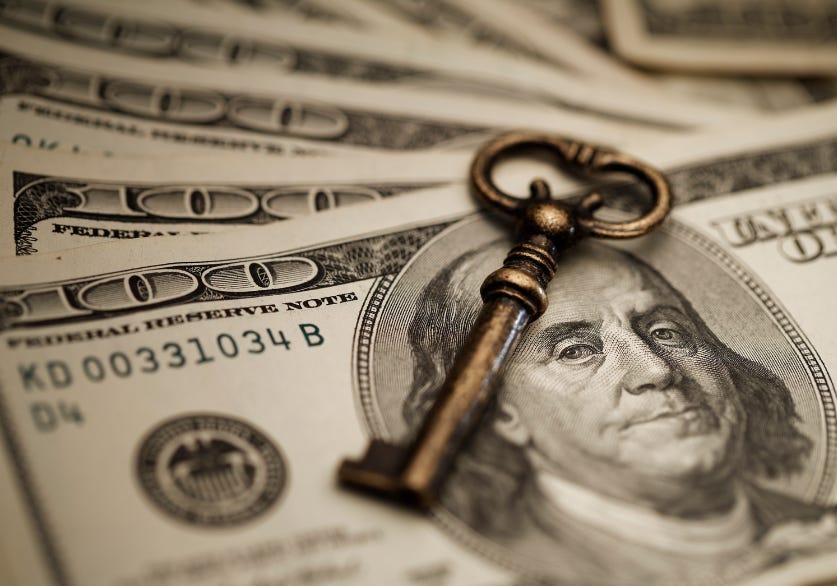Are You Being a Business or a Charity?
Some questions to help you check on your boundaries during this giving season.
Let's say you were on the verge of buying something "expensive" you really want, or you knew you were investing in a great opportunity to get closer to where you desire to go. Would you want the salesperson or the service provider to question if you could really afford it, especially after you've already made the buying or investing decision?
How would you feel if you found out you've been underpaying for a product or service or not getting the best opportunity for you or your child because there was an unspoken assumption made about you and your economic situation?
This could be all the more reason why entrepreneurs shouldn't be expected to keep track of what may or may not be in the wallets of those they serve before they decide on how to run their businesses. No one can stay in business for the long run by operating like an unpredictable charity.
In this post, to celebrate this giving time of the year, I’d like to take you through some further questions and an exercise to help you assess your charity boundaries and how much actual money you might be leaving on the table right now due to your charitable desires. Consider the following two questions to start:
Are you being paid according to the true value or a fair-market price of your offer?
OR…is it more like you're just giving or receiving a donation?
These might be uncomfortable questions to contemplate if you’re in the arts, education, or any other passion- or service-based line of work. But they can be a good and honest to consider as you up-level your mindset for greater entrepreneurial success. After all, do we really want our annual raises or price increases to at all be interpreted as holiday gifts?
Business Transactions vs. Donations
If you think about it, there are really only two ways to receive money, at least ethically: business transactions and donations. You’re either receiving money in exchange for doing a job and/or selling a product or service, or you’re receiving a gift, a loan or a donation —otherwise, you might be committing a crime!
And since many of us artists and educators are in situations where getting paid can depend on prior donations or tithing, we’re extra vulnerable to letting our charitable ideals inhibit our ability to earn not even enough, let alone enough or more than enough. Afterall, there’s no shortage of opportunities where the prestige seems to be what matters, and/or there’s just an implicit expectation that you’re supposed to be underpaid in support of the cause or the art.
There is always more nuance than meets the eye in every transaction, especially in the arts and in the helping or educational professions. So taking the time to think about how you’d categorize your transactions in this way can help you become more aware of whether or not you’re earning more of what you could be earning—and thus ultimately affording to be even more philanthropic when you’re finally earning enough.
One of the biggest battles we have to continually deal with is keeping our emotions and personal belief systems from getting in the way of making the right or the most objective business transactions. Things like caring about our art, caring about children, caring about God, or caring about something else, among other factors, can cause us to lose sight of the true life-time value of what we're offering and what we should really be receiving for it.
Was it a Reward or a Donation?
If you objectively look at all the money you receive, can you say you're always rendering service worthy of the highest appropriate price and receiving that price in full?
Are you being someone's charity case?
OR are you, if even just a little, making them into a charity case?
Consider the following sequence of questions with each of your transactions:
Was the transaction influenced by a desire to be charitable by either you or the paying party?
Did you feel like you had to ask for less than you otherwise would charge?
Did they feel a need to pay more than they might otherwise have paid?
If the previous answer is "Yes," was the higher payment amount enough, or did it still fall short of what you needed and/or fall short of reflecting the true lifetime value of your offer?
Finally, if you answered "Yes" to any of the above questions, how much more or less would you have received if the transaction truly reflected the true lifetime value of the offer?
For more thoughts on the lifetime value, check out this post:

A Mathematical Reality Check
If you're not afraid to do the math, add up the total of the theoretical differences in the amounts from all your transactions to see how much you might have left on the table. Then honestly ask yourself how much more of that “missing” income could you have received if you could simply ask for it with grateful energy.
How much would you be earning if you didn't have to feel the need to be charitable (or codependent!), or if you didn't feel like you had to just take whatever you could get from someone who otherwise wouldn’t pay at all?
I usually roll my eyes at the phrase “know your numbers,” because the numbers most gurus refer to are related to expenses, budgeting, and other surface-level items related to the act of managing money you already have. Managing or keeping more money is a very different skillset and mindset from actually earning or making more money. And my goal here is to help you become more aware of how much more you could be already earning without much more effort other than by shifting your beliefs.
One of the fastest ways for us artists and educators to ethically grow our income is by making sure we simply have healthy boundaries in place around our own charitable desires and values—as well as around the values others may be imposing on us—and staying focused on the true value of what we're uniquely offering. As author Jen Sincero put it in her book Badass Habits, "Good, clear boundaries are a gift to everyone. Resentment, exhaustion, guilt, obligation and passive-aggressiveness are gifts to no one."
I’ve mentioned before that most of the money problems directly within our control can trace back to us or someone we know having a problem with asking for enough money because they risk being judged for wanting more than someone might believe they need. And so too many of us artists, educators tend to be afraid to ask for what we want or deserve.
Instead, we fall into the trap of thinking we can only sell our offers for what we think is socially acceptable to survive on according to others' values, irrespective of our own values, and irrespective of the true lifetime value we are creating for those we're serving. So let’s figure out where we can set the boundary and avoid that trap once and for all!
Much gratitude for reading!
PS - But how much really is “rich” to you?
In The Science of Getting Rich, Wallace Wattles wrote, "Get rich; that is the best way you can help the poor." This statement struck me when I first read it. And it might be controversial to anyone who believes in a finite supply of money and that the only way to get rich is by exploiting or stealing from others. Never mind that we live in an abundant limitless universe and possibilities to help others are forever plentiful.
But how much really is “rich” to you? And do you have your own personal healthy definition of what being "rich" means? Need help determining what that could be for you?
I ask because IF it can at least be OK to get “rich” by serving others without causing harm to anyone or the environment, then does anyone really benefit if you stay broke or poor? And who could or would benefit if you achieved all you could dream of?
These are just a few of the kinds of personal development questions I ask clients when discussing The Science of Getting Rich. The more I read and contemplated the teachings in this small but mighty book, the more I felt artistically, academically, and even spiritually permitted to not just think positively about money, but to think abundantly about creating lasting wealth and having actual business success!
Actual business success requires a very different way of thinking from what we may have been taught in school. Studying this book helped me:
😀 Become more confident with my pricing.
🙃 Not be afraid to market and promote myself.
🤗 Sell with a greater sense of service.
😸 Get clarity that I’m really in the right business.
🤩 Develop unshakable faith I can succeed at anything.
🥹 Feel permitted to live the life I actually want to live.
These are just a few of the results I’ve gained, and my clients have gained, since this book became a philosophical cornerstone of my business.
And now, I would love to extend to YOU an early invitation to a new live virtual weekly coaching and mastermind opportunity I’m now offering based on its teachings and more! If you're a committed entrepreneur or small business owner seeking to generate way more money, optimize your mindset, and design your next level of success in 2025, this is for you!🤑
🌟 AND because it's VIRTUAL, you can participate from ANYWHERE! 😎
The First Group Meeting is on January 14, 2025
Making a study of this text—including studying ourselves and how we may respond to the different ideas in it!—and using it as a guide can be one of the most transformational things you can do for your life and business! DM me if you have any questions, otherwise I’ll see you in class!















